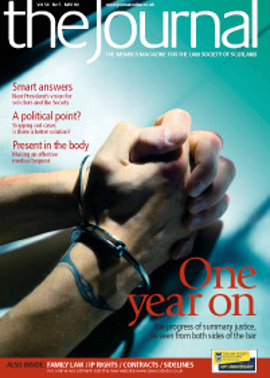Taking diligence forward

The Bankruptcy and Diligence etc (Scotland) Act 2007 is the largest Act passed by the Scottish Parliament to date. The Accountant in Bankruptcy (AiB) has policy responsibility for bankruptcy and diligence and for commencement of the Act.
Whilst some provisions have already been commenced, the full Act has not yet been brought into force. On 22 April 2009, Part 5 and Part 10 were commenced, dealing respectively with changes to inhibition, and arrestment in execution and actions of furthcoming. Some aspects of these diligences not changed continue to be provided for in the common law.
Four Scottish Statutory Instruments, which can be found on www.opsi.gov.uk, support the inhibition and arrestment changes, together with Acts of Sederunt prepared by the Court of Session Rules Council and the Sheriff Court Rules Council.
Changes incorporated in Part 5
Part 5 codifies and, to an extent, alters the common law on inhibition in execution. Changes to inhibition on the dependence were previously introduced when Part 6 of the Act was commenced on 1 April 2008.
- Creditors are no longer required to obtain “letters of inhibition” from the Court of Session in order to inhibit in execution of a sheriff court judgment. Warrant for all lawful execution is automatically contained in a sheriff court extract decree.
- For individual debtors, the schedule of inhibition served in execution of an inhibition must be accompanied by a Debt Advice and Information Package (DAIP). Failure to provide this will render the inhibition incompetent.
- A new s 155 is inserted into the Titles to Land Consolidation (Scotland) Act 1868 to clarify from when the inhibition takes effect, including in those cases when a notice of inhibition has been registered.
- Where an inhibition on the dependence has been limited to specific property at the discretion of the sheriff under s 15J(b) of the Debtors (Scotland) Act 1987, any inhibition in execution of a decree is no longer limited to that property. Further clarification is provided by the Bankruptcy and Diligence etc (Scotland) Act 2007 (Inhibition) Order 2009 (SSI 2009/129), which came into force on 22 April 2009. This modifies s 152 of the 2007 Act to require registration of a decree following inhibition on the dependence limited under s 15J(b) of the 1987 Act. The order also clarifies when the effect of such a limited inhibition is widened.
- Inhibitions no longer confer any preference in sequestration, insolvency proceedings or other processes with ranking.
- Inhibitions are no longer terminated by payment of the debt alone. They cease to have effect when the debt is paid plus interest, expenses, and expenses of discharging the inhibition.
Changes incorporated in Part 10
Part 10 of the Act deals with arrestment in execution and inserts ss 73A-73T into the Debtors (Scotland) Act 1987.
- The arrestee has a duty to disclose to the creditor the nature and value of any funds or moveable property arrested within three weeks from the date on which the schedule of arrestment is served. Failure to disclose may result in financial penalty or be treated as contempt of court.
- Arrested funds are subject to automatic release 14 weeks after the arrestment if no objection is raised. Actions of furthcoming for releasing funds will no longer normally be necessary under this procedure, but will still be required for the release of goods.
- Sums that can be attached by arrestment are limited. For ascertainable debts, funds attached by the arrestment will be calculated with reference to the sum due, expenses and interest. The previous “more or less” provision which attached all funds in a bank account without reference to the size of the actual debt no longer applies.
- A protected minimum balance (PMB) of funds within bank and other accounts is introduced. Only funds above the minimum balance can be arrested. The PMB is currently set at £370 but will increase when proposed future changes to Earnings Arrestment Regulations are progressed.
NB New s 73D, which provides for the provision of a DAIP, is not being commenced at this point in time.
Tables for deductions from earnings by arrestment are contained in the Diligence against Earnings (Variation) (Scotland) Regulations 2006 (SSI 2006/116). It was intended to update these tables by the Diligence against Earnings (Variation) (Scotland) Regulations 2009 (SSI 2009/98) on 6 April 2009. The 2009 Regulations have now been revoked (SSI 2009/133). It is anticipated that changes to the existing regulations will now be introduced later in 2009. This will be confirmed in due course.
Further information can be found on the AiB website at www.aib.gov.ukIn this issue
- Obama's first 100 days
- Playing politics with the Scottish constitution
- Beneficiaries are suffering from the high cost of advice
- Ever forwards
- Shared principles
- A year of debate
- Ask the audience
- Property sales continue to fall
- Where fact makes law
- Giving up the body
- Playing politics with the constitution
- Matrix evolutions
- Make it happen
- View from the top
- Retiring thoughts
- Law reform update
- Phone a friend
- Lighting the way
- Is Big Brother watching too closely?
- Ask Ash
- Selection, the professional way
- A claims pandemic?
- Bumper crop
- A place in the sun?
- Equality redefined
- Taking diligence forward
- Scottish Solicitors' Discipline Tribunal
- Book reviews
- Website review






